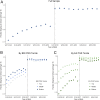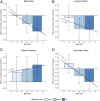Education can reduce health differences related to genetic risk of obesity
- PMID: 30279179
- PMCID: PMC6196527
- DOI: 10.1073/pnas.1802909115
Education can reduce health differences related to genetic risk of obesity
Abstract
This work investigates whether genetic makeup moderates the effects of education on health. Low statistical power and endogenous measures of environment have been obstacles to the credible estimation of such gene-by-environment interactions. We overcome these obstacles by combining a natural experiment that generated variation in secondary education with polygenic scores for a quarter-million individuals. The additional schooling affected body size, lung function, and blood pressure in middle age. The improvements in body size and lung function were larger for individuals with high genetic predisposition to obesity. As a result, education reduced the gap in unhealthy body size between those in the top and bottom terciles of genetic risk of obesity from 20 to 6 percentage points.
Keywords: education; gene-by-environment; genetics; health; obesity.
Copyright © 2018 the Author(s). Published by PNAS.
Conflict of interest statement
The authors declare no conflict of interest.
Figures



References
-
- Freese J, Shostak S. Genetics and social inquiry. Annu Rev Sociol. 2009;35:107–128.
-
- Cutler DM, Lleras-Muney A. Education and health: Evaluating theories and evidence. In: House J, Schoeni R, Kaplan G, Pollack H, editors. Making Americans Healthier: Social and Economic Policy as Health Policy. Russell Sage Foundation; New York: 2008.
-
- Case A, Fertig A, Paxson C. The lasting impact of childhood health and circumstance. J Health Econ. 2005;24:365–389. - PubMed
-
- Almond D, Currie J, Duque V. Childhood Circumstances and Adult Outcomes: Act II. National Bureau of Economic Research; Cambridge, MA: 2017.
Publication types
MeSH terms
Grants and funding
LinkOut - more resources
Full Text Sources
Medical
Research Materials
Miscellaneous

